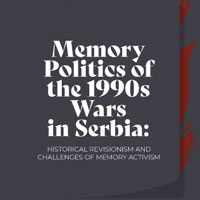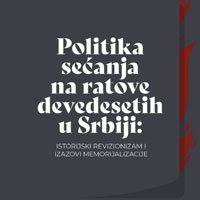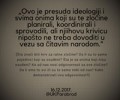Memory Politics of the 1990s Wars in Serbia: Historical Revisionism and Challenges of Memory Activism
 Since 2012, when the Serbian Progressive Party came to power, the wars of the 1990s became the focal point of the official memory politics and crucial for the political legitimacy of the SNS government. The populist discourse of the return of the national pride is central to state-sponsored memory work, arguing that the previous governments and international community coerced the Serbian nation to feel ashamed about its heroes and victims of the 1990s wars. The current regime uses the fact that the previous governments did not focus on the 1990s in their memory politics as a demarcation line and source of legitimacy. Because of the SNS and their political allies, the Serbian people are finally allowed and able, as the dominant narrative claims, to remember their heroes and victims with pride. The government builds its political legitimacy on its commitment to the industry of memory, which involves large-scale commemorations, usage of media technologies, cultural production and new ways of disseminating the dominant narratives.
Since 2012, when the Serbian Progressive Party came to power, the wars of the 1990s became the focal point of the official memory politics and crucial for the political legitimacy of the SNS government. The populist discourse of the return of the national pride is central to state-sponsored memory work, arguing that the previous governments and international community coerced the Serbian nation to feel ashamed about its heroes and victims of the 1990s wars. The current regime uses the fact that the previous governments did not focus on the 1990s in their memory politics as a demarcation line and source of legitimacy. Because of the SNS and their political allies, the Serbian people are finally allowed and able, as the dominant narrative claims, to remember their heroes and victims with pride. The government builds its political legitimacy on its commitment to the industry of memory, which involves large-scale commemorations, usage of media technologies, cultural production and new ways of disseminating the dominant narratives.
This paper analyses the memory politics of the 1990s wars and outlines the problem of historical revisionism in contemporary Serbia from the overthrow of Slobodan Milošević until today. The first section of the paper offers an overview of the memory of the 1990s wars during the first decade after the fall of Milošević. The expectations from the democratic changes quickly turned into disappointment as the new state authorities showed the lack of willingness to confront the questions of guilt and responsibility of Serbia and its forces during the 1990s wars. Various patterns of denial and relativisations are analysed. The central part of the paper focuses on the period since 2012 and populist state-sponsored memory politics. To facilitate a better understanding of the war narratives, commemorative practices and the emergence of the 1990s wars in official memory politics, the paper explains the main characteristics of populist memory politics. The paper proceeds to analyse the interpretation of the 1990s as liberation wars, the national program of commemorations and the industry of memory, focusing mainly on Operation Storm, the Kosovo war and NATO bombing of Yugoslavia as the focal points of official memory politics. The final section concludes with a brief outlook on memory activism and its challenges in facing the industry of memory from above.
The paper “Memory Politics of the 1990s Wars in Serbia: Historical Revisionism and Challenges of Memory Activism” is available here.








